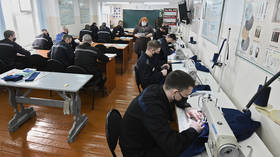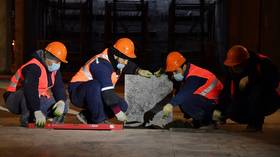Crime can pay? Some Russian convicts earning more than doctors & lawyers from work behind bars, prison bosses admit

Russia’s notoriously tough and uncompromising prisons hardly have a reputation as a one-way ticket to the top, but for some lucky lags, inmate labor is proving to be an extremely lucrative sideline while they’re serving time.
The country’s Federal Penitentiary Service revealed to Moscow’s Izvestiya daily on Thursday that, while most prisoners take home peanuts in their pay packets for toiling in manual and industrial jobs, a small number were able to rack up relatively large salaries compared to their friends and families on the outside. Kristina Panshina, the department's spokeswoman, told journalists 715 new roles had been created across 11 regions of the country as part of a drive to increase the availability of work for those behind bars.
The average monthly salary of those sentenced to forced labor, officials say, is 20,000 to 24,000 rubles ($270-330). However, a representative for the department divulged that, in some cases, those on the cell block can take home cushy sums of up to 220,000 rubles (close to $3,000) a month, which, according to some estimates, could be 10 times more than the poorest-paid prison guards.
Also on rt.com ‘Not a gulag’: Russia’s government in talks to create new convict labor super-camps to cut need for migrants, minister revealsThe cash-rich inmate who took home that hefty wedge, the department revealed, was working in a prison colony in the region around Belgorod, not far from the border with Eastern Ukraine. Other high-earners include convicts toiling in Primorsky, in the icy Far East of the country, where one forced laborer earned 102,000 rubles ($1,389) in a month.
Both salaries will likely far outstrip the earnings of the police officers who arrested them in the first place, as well as the lawyers who tried to keep them out of the clink. Local teachers, doctors, and other professionals, especially early on in their careers, are unlikely to see pay packets of that size. However, at the top end of many of these career ladders, salaries can be highly competitive, even compared with Western standards.
However, Russia, as with most former Soviet nations, has a sizeable informal economy, and many people are thought to operate lucrative sidelines. As a result, analysts frequently caution that official statistics, both for salaries and for the performance of the economy as a whole, vastly underestimate just how much wealth people actually have.
Prison labor has become a hot-button topic in the country in recent days. Earlier this week, Minister of Justice Konstantin Chuychenko divulged that the government was in talks with big business to set up new camps and facilities near construction sites and industrial plants “where a thousand people or more could serve sentences by carrying out correctional labor.”
The move comes after prison service director Aleksandr Kalashnikov indicated that around 188,000 inmates were eligible to work throughout their terms, but that the current availability of jobs was depriving them of the chance to earn. He suggested that these locked-up laborers could go some way towards meeting a shortfall in migrant workers, after construction firms and other industries warned that the pandemic and border closures had resulted in a manpower crisis.
“We are ready to organize this. It will not be a gulag – it will be absolutely new, decent conditions,” he insisted, adding that participants would receive a “decent salary” for their efforts.
Like this story? Share it with a friend!















